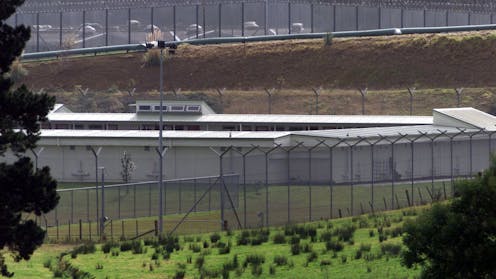‘Chaotic, sometimes dangerous places’ – why successful rehab for prisoners on remand will be hard to achieve
- Written by Devon Polaschek, Professor of Psychology/Security and Crime Science, University of Waikato

Last week’s budget allocated NZ$472 million in new funding to deal with a growing prison population[1] caused by greater use of prison remand and proposals to increase prison sentence lengths.
The new funding comes on top of $78 million provided in the 2024 budget to extend rehabilitation to remand prisoners, enabled by an amendment to the Corrections Act[2] late last year.
The question is, will any of this make New Zealanders safer?
Overall, the evidence suggests[3] prisons have no real effect on reoffending rates, and pre-trial remand in prison may even increase offending. Prisons only reduce a person’s risk to public safety while that person is in prison.
But most people are eventually released, so imprisonment can be a very expensive way of “kicking the can down the road” when it comes to public safety.
That’s where rehabilitation comes in. A very specific type, known as “offence-focused rehabilitation[4]”, can reduce the risk of prisoners reoffending and make our communities safer. It looks like psychological therapy for anxiety or depression, but the “symptoms” are drivers of crime.
In treatment, these personal causes of crime are identified and then people are helped with new ways of living and behaving. People meet one-on-one or in small groups, for weeks or months, with therapy staff who are well trained and supported.
Treatment works best when people feel safe to abandon the survival strategies they developed in chaotic childhoods – strategies that might have helped then, but now bring them back to prison. That kind of work is slow, painful and delicate.
Rehabilitation and recidivism
The Department of Corrections provides one example of this type of rehabilitation: a treatment programme for sentenced men at high risk of violence. This takes place in small units dedicated to therapy.
It reduces reimprisonment by around 11 men per 100 treated[5]. That’s a meaningful reduction. Fiscally, the benefits of the programme may far outweigh the costs[6].
But that success relies on a stable, supportive unit environment, careful monitoring of the quality of treatment, and a population that stays put long enough for treatment to take hold. Just 86 men[7] started one of those programmes last year.
Results from other rehabilitation programmes Corrections provides show they don’t reduce recidivism[8]. Why they don’t work isn’t clearly established. The most likely cause is programmes not being delivered as intended, due to limited resources or other factors.
Prisoners being housed with people not rehabilitating may also undermine progress. Either way, these results illustrate the difficulties of providing effective rehabilitation.
The challenge of rehab in remand
Can effective rehabilitation be provided for people remanded in prison? Nearly half the prison population is on remand, waiting for their trial or sentence – and the number is forecast to increase further[9]. So why not use that time to rehabilitate?
Challenges in creating an environment supportive of rehabilitation increase significantly in remand units. They are chaotic, sometimes dangerous places, with a constantly churning population. Almost half of remand stays last less than a month, most less than two weeks.
People come in with no fixed length of stay, they are often double-bunked with strangers, and sometimes remain locked in their cells for most of the day. Mental illness, gang conflict, bullying and violence are more prevalent than for sentenced prisoners. Transfers happen without warning, and family and whānau may have no direct access.
If offence-focused rehabilitation does not work for most sentenced prisoners, it is less likely to work here. Our recent review of international research[10] found very few programmes for people remanded in prison, and none that were offence-focused rehabilitation. These are not currently environments where offence-focused rehabilitation is workable.
But even if it were workable, under the amended law, few remand prisoners would be eligible because most are awaiting trial and therefore presumed innocent.
Those awaiting sentencing are eligible, but about one-fifth are released on the day they are sentenced because they have already served enough time in prison. Others get sentences too short for a referral to be processed.
Not a panacea
The greatest impact on public safety will always come from reducing the factors that send people to prison in the first place.
For those who do end up in prison, offence-focused rehabilitation can make them safer people. But it relies on them taking what is offered and using it; progress can’t be forced.
Rehabilitation can be effective but it is not a panacea. From a community perspective, any benefits of rehabilitation are likely to be outweighed by the effects of increasing imprisonment rates.
Extending rehabilitation to remand prisoners is unlikely to change that. Instead, we could put resources into developing innovative options for safely and humanely managing more people on remand or on sentence in the community.
The added benefit would be that they could engage in rehabilitation there, where it actually works better[11] than in prison.
References
- ^ deal with a growing prison population (www.beehive.govt.nz)
- ^ amendment to the Corrections Act (www.legislation.govt.nz)
- ^ evidence suggests (doi.org)
- ^ offence-focused rehabilitation (doi.org)
- ^ 11 men per 100 treated (www.corrections.govt.nz)
- ^ far outweigh the costs (doi.org)
- ^ Just 86 men (www.rnz.co.nz)
- ^ show they don’t reduce recidivism (www.corrections.govt.nz)
- ^ increase further (www.justice.govt.nz)
- ^ review of international research (doi.org)
- ^ where it actually works better (doi.org)
Authors: Devon Polaschek, Professor of Psychology/Security and Crime Science, University of Waikato










